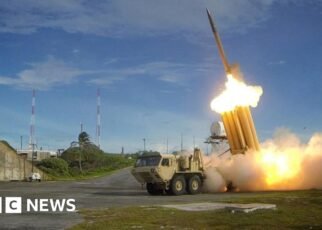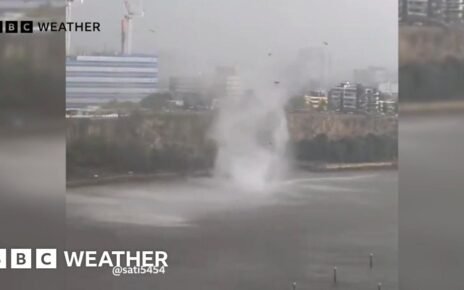[ad_1]
 Reuters
ReutersThe US says it will deploy a high-altitude anti-missile system and a military crew to Israel to help bolster that country’s air defences after a missile attack from Iran earlier this month.
A Pentagon statement said President Joe Biden had ordered the Terminal High-Altitude Area Defense (Thaad) battery and its crew be sent “to defend Israel”.
Iran launched almost 200 ballistic missiles towards Israel on 1 October. The Israeli military said most were intercepted, but a number struck central and southern Israel.
Israel has not yet said how it will respond to the attack, but Defence Minister Yoav Gallant has said it will be “deadly, precise and above all surprising”.
Iran has in turn said it will not let any attack by Israel go unanswered.
The Pentagon said the Thaad deployment “underscores the United States’ ironclad commitment to the defense of Israel, and to defend Americans in Israel, from any further ballistic missile attacks by Iran”.
The US sent a Thaad battery to the Middle East after Hamas attacked southern Israel on 7 October last year. It previously sent a Thaad battery to Israel in 2019 for training and an air defence exercise.
But the US deploying a crew to Israel is more rare.
Iran said its 1 October missile barrage was a response to Israel’s assassinations of the Hezbollah leader Hassan Nasrallah and a senior Iranian Revolutionary Guards Corps (IRGC) officer in Beirut, and of the Hamas leader Ismail Haniyeh in Tehran.
Israel has dramatically escalated its campaign against Iran-backed Hezbollah in recent weeks, carrying out deadly air strikes across southern and eastern Lebanon and in parts of Beirut.
Before that, Israel and Hezbollah had been trading cross-border fire on a near daily basis since last October, when Hezbollah began firing into Israel which it said was a show of support for Palestinians in Gaza. It had said it would stop firing if there was a ceasefire in Gaza.
However, international efforts to get Israel and Hamas to agree to a ceasefire in Gaza have so far failed.
What is Thaad?
The US announcement underlines its growing concern about ballistic missiles targeting Israel.
Thaad provides yet another layer of intercept protection against what are called endo and exo (inside and outside) atmospheric threats. It costs around a billion dollars a battery.
Manufacturer Lockheed Martin describes the system as highly effective against short, medium and long-range targets.
Thaad missiles, which have a reported range of up to 200km (124 miles), are of a “hit to kill” variety, rather than using proximity detonation to bring down targets.
Israel’s missile defence comprises the Iron Dome for short-range rockets, David’s Sling for longer range weapons and cruise missiles, plus Arrow 2 and Arrow 3 against ballistic missiles launched from over 1,000km (621 miles) away.
Countering ballistic missiles threats is particularly difficult because of those missiles’ high speed and the rapid rate of change of aspect in flight – particularly during their terminal phase.
According to the Centre for Strategic and International Studies, Hezbollah in Lebanon has some 150,000 rockets – mainly supplied by Iran – at its disposal.
[ad_2]
Source link




